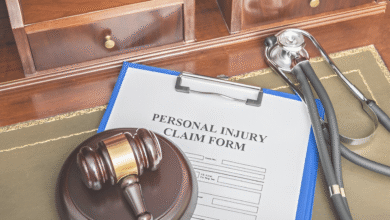What to Do After a Car Accident in Texas: Legal Steps to Take
What to do after a car accident in Texas: Follow these legal steps to protect your rights, ensure safety, and secure fair compensation.

Car accidents are an unfortunate reality of modern life, and knowing what to do after a car accident in Texas can make a significant difference in protecting your rights, ensuring your safety, and securing fair compensation for any damages or injuries. Texas, like other states, has specific laws and procedures that govern how accidents should be handled. Whether you’re involved in a minor fender-bender or a serious collision, taking the right legal steps can help you navigate the aftermath effectively. This article will provide a comprehensive guide on the legal steps to take after a car accident in Texas, ensuring you are well-prepared to handle the situation.
In the following sections, we will discuss everything from immediate actions at the accident scene to dealing with insurance companies, filing claims, and seeking legal representation. By understanding the process, you can protect yourself from potential legal pitfalls and ensure that your rights are upheld. Let’s dive into the detailed steps you should take after a car accident in Texas.
Immediate Steps to Take at the Accident Scene
The moments immediately following a car accident can be chaotic and stressful. However, staying calm and taking the right steps can help ensure your safety and protect your legal rights. The first thing you should do after a car accident in Texas is to check for injuries. If you or anyone else involved in the accident is injured, call 911 immediately to request medical assistance. Even if the injuries seem minor, it’s important to seek medical attention as some injuries may not be immediately apparent.
Next, move your vehicle to a safe location if it is obstructing traffic and can be driven safely. If the car is not drivable, turn on your hazard lights and set up flares or reflective triangles to alert other drivers. This step is crucial to prevent further accidents and ensure the safety of everyone involved.
Once you’ve ensured safety, call the police to report the accident. In Texas, you are required to report an accident if it results in injury, death, or property damage exceeding $1,000. A police report can be invaluable when filing an insurance claim or pursuing legal action, as it provides an official record of the incident.
While waiting for the police to arrive, exchange information with the other driver(s) involved in the accident. This includes names, contact information, driver’s license numbers, insurance details, and vehicle registration information. Avoid discussing fault or making statements that could be interpreted as an admission of liability, as this could complicate your case later.
If there are witnesses to the accident, ask for their contact information as well. Witness statements can be crucial in determining fault and supporting your claim. Additionally, take photos of the accident scene, including vehicle damage, skid marks, road conditions, and any visible injuries. These photos can serve as important evidence when dealing with insurance companies or in court.
Seeking Medical Attention
Even if you feel fine after the accident, it’s essential to seek medical attention as soon as possible. Some injuries, such as whiplash or internal bleeding, may not show symptoms immediately but can have serious long-term consequences. A medical professional can assess your condition and provide documentation of any injuries, which is critical for your insurance claim or personal injury case.
Keep detailed records of all medical treatments, including doctor’s visits, medications, and therapy sessions. These records will help establish the extent of your injuries and the associated costs, which can be included in your claim for compensation.
Reporting the Accident to Your Insurance Company
In Texas, you are required to report a car accident to your insurance company, even if you were not at fault. Notify your insurer as soon as possible and provide them with the necessary details about the accident. Be honest and accurate in your account, but avoid admitting fault or making speculative statements.
Your insurance company will likely ask for a recorded statement. While you are obligated to cooperate, it’s advisable to consult with an attorney before providing a statement to ensure your rights are protected. An experienced attorney can help you navigate the complexities of dealing with insurance companies and ensure that you receive fair compensation.
Understanding Texas Car Insurance Laws
Texas operates under a fault-based system, meaning the driver who is found to be at fault for the accident is responsible for covering the damages. This includes medical expenses, property damage, and other losses. Texas law requires drivers to carry minimum liability insurance coverage, which includes:
$30,000 for bodily injury per person
$60,000 for bodily injury per accident
$25,000 for property damage per accident
However, these minimum limits may not be sufficient to cover all damages in a serious accident. If the at-fault driver is uninsured or underinsured, you may need to rely on your own insurance policy’s uninsured/underinsured motorist coverage.
Filing a Personal Injury Claim
If you’ve been injured in a car accident due to someone else’s negligence, you may be entitled to compensation through a personal injury claim. In Texas, you generally have two years from the date of the accident to file a personal injury lawsuit. This is known as the statute of limitations, and failing to file within this timeframe can result in losing your right to compensation.
To build a strong personal injury case, you’ll need to prove that the other driver was at fault and that their negligence caused your injuries. This requires gathering evidence such as police reports, medical records, witness statements, and expert testimony. An experienced personal injury attorney can help you navigate this process and ensure that your case is presented effectively.
Dealing with Insurance Adjusters
Insurance adjusters are trained to minimize the amount their company pays out on claims. They may use various tactics, such as offering a low settlement or questioning the severity of your injuries, to reduce your compensation. It’s important to be cautious when dealing with insurance adjusters and avoid accepting any settlement offers without consulting an attorney.
An experienced attorney can negotiate with the insurance company on your behalf and ensure that you receive a fair settlement that covers all your damages, including medical expenses, lost wages, pain and suffering, and property damage.
When to Hire a Car Accident Attorney
Hiring a car accident attorney is not always necessary, but there are certain situations where having professional legal representation can make a significant difference in the outcome of your case. One of the most common scenarios is when you or a loved one has suffered severe injuries or fatalities as a result of the accident. In such cases, the stakes are high, and the compensation you receive can impact your ability to cover medical bills, rehabilitation costs, and lost wages. An experienced attorney can help you navigate the complexities of personal injury law, gather the necessary evidence, and negotiate with insurance companies to ensure you receive fair compensation. Additionally, if the accident involves disputed liability or conflicting accounts of what happened, an attorney can investigate the incident, consult with experts, and build a strong case to prove the other party’s negligence.
Another situation where hiring a car accident attorney is advisable is when dealing with insurance companies that offer low settlement amounts or deny your claim altogether. Insurance adjusters often prioritize their company’s profits over your well-being and may use tactics to minimize your payout. An attorney can handle communications with the insurance company, counter lowball offers, and fight for a settlement that adequately covers your damages. Furthermore, if your case involves multiple parties, commercial vehicles, or complex legal issues, an attorney’s expertise is invaluable. They can help you understand your rights, meet legal deadlines, and represent you in court if necessary. Ultimately, hiring a car accident attorney can provide peace of mind, protect your rights, and increase your chances of receiving the compensation you deserve.
Read More: Car Accident Injury Claims in Texas: What You Need to Know
Conclusion
Knowing what to do after a car accident in Texas is crucial for protecting your rights and ensuring fair compensation for your damages. From taking immediate steps at the accident scene to dealing with insurance companies and filing a personal injury claim, each step plays a vital role in the outcome of your case. By staying informed and seeking professional legal assistance when needed, you can navigate the aftermath of a car accident with confidence.
If you’ve been involved in a car accident in Texas, don’t hesitate to reach out to an experienced attorney who can guide you through the process and help you secure the compensation you deserve. Remember, taking the right legal steps after a car accident can make all the difference in your recovery and future well-being.
FAQs
What should I do immediately after a car accident in Texas?
Check for injuries, move to a safe location, call 911, exchange information with the other driver, and document the scene with photos.
Do I need to report a car accident to the police in Texas?
Yes, you must report the accident if it results in injury, death, or property damage exceeding $1,000.
How long do I have to file a personal injury claim in Texas?
The statute of limitations for personal injury claims in Texas is two years from the date of the accident.
What if the other driver is uninsured?
You may need to rely on your own uninsured/underinsured motorist coverage to cover your damages.
Should I hire an attorney after a car accident?
It’s advisable to hire an attorney if you’ve suffered severe injuries, are disputing fault, or are dealing with complex legal or insurance issues.











